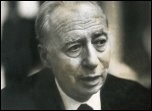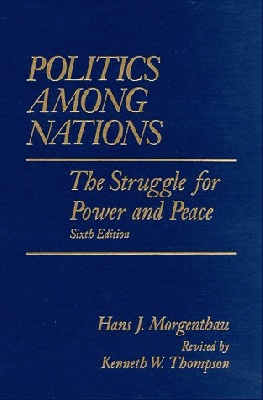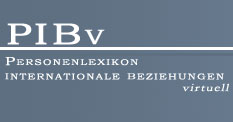Morgenthau, Hans J.
 Hans Joachim Morgenthau
Hans Joachim Morgenthau
* 17.02.1904 in Coburg
† 19.07.1980 in New York
Deutsch-amerikanischer Politikwissenschaftler und Völkerrechtler, anfänglich eher idealistisch argumentierend, später durch Nationalsozialismus, Emigration und Ost-West-Konflikt gewendeter Begründer des klassischen Realismus , Vertreter des anthropologischen Ansatzes, politischer Philospoh und Verantwortungsethiker, Lehrer von Henry Kissinger
Werdegang
1923 – 1927 Studium der Philosophie, später Jura und Philosophie in Berlin, Frankfurt a.M. und München
1928 – 1931 Referendariat in der Kanzlei von Hugo Sinzheimer, Frankfurt a.M.
1929 Promotion in Jura (Völkerrecht) in Frankfurt a.M.
1932 Habilitation in Genf
1932 Dozent für Öffentliches Recht an der Universität Genf
1935 Emigration nach Spanien
1935 – 1936 Professor in Madrid
1937 Emigration in die USA
1937 – 1939 Professor am Brooklyn College, New York
1939 – 1943 Professor an der University of Kansas, Kansas City
1943 – 1968 Professor an der University of Chicago
1946 – 1951 Veröffentlichung der Trilogie “Scientific Man vs. Power Politics (1946), „Politics Among Nations“ (1948) und „In Defense of the National Interest“ (1951) zur Grundlegung des realistischen Paradigmas
1963 – 1968 Albert A. Michelson Distinguished Service Professor an der University of Chicago
1968 – 1974 Leonard Davis Distiguished Professor am City College of the City University of New York
1975 – 1980 Lehrtätigkeit an der New School for Social Research, New York
Publikationen
Bücher

Die internationale Rechtspflege, ihr Wesen und ihre Grenzen. Leipzig: Robert Noske 1929. (Dissertation)
= Frankfurter Abhandlungen zum Kriegsverhütungsrecht Heft 12
La notion du “politique” et la théorie des differends internationaux. Paris: Libraire du Recueil Sirey 1933.
La realité des normes. En paticulier des normes du droit international. Fondements d’une théorie des normes. Paris: Alcan 1934.
Positivisme mal compris et théorie réaliste du droit international. Tirada aparte de la “Colección de Estudios históricos, jurídicos, pedagógicos y literarios”. Homenaje a D. Rafael Altamira. Madrid: Bermejo 1936.
Scientific Man vs. Power Politics. Chicago: University of Chicago Press 1946.
Peace, Security and the United Nations. Chicago: University of Chicago Press 1946.
Politics Among Nations: The Struggle for Power and Peace. New York: Alfred Knopf 1948.
(2. Aufl. 1954; 3. Aufl. 1960; 4. Aufl. 196; 5. Aufl. 1973; 6. Aufl. überarbeitet von Kenneth W. Thomson. New York: McGraw-Hill 1985; 7. Aufl. 2006., dtsch: Macht und Frieden. Grundlegung einer Theorie der internationalen Politik. Gütersloh: Bertelsmann 1963. = Übersetzung von Gottfried-Karl Kindermann nach der 3. Aufl. 1960)

Germany and the Future of Europe. Chicago: University of Chicago Press 1951.
In Defense of the National Interest: A Critical Examination of American Foreign Policy. New York: Alfred Knopf 1951.
(Nachdr.: University Press of America, Washington, D.C.: 1982)
Dilemmas of Politics. Chicago: University of Chicago Press 1958.
Toward a Theory of International Politics. University of Chicago : o.V. [ca.1960]
The Purpose of American Politics. New York: Alfred Knopf 1960.
The Crisis of American Foreign Policy. Storrs: University of Connecticut 1960.
The Tragedy of German-Jewish Liberalism. New York: Leo Baeck Institute 1961.
Politics in the Twentieth Century. Chicago: University of Chicago Press 1958-1962. 3 Bde. (= Aufsatzsammlung).
 |
Trilogie "Politics in the Twentieth Century", 1958-1962.
|
Bd. 1: The Decline of Democratic Politics. 1958
Bd. 2: The Impasse of American Foreign Policy. 1958
Bd. 3: The Restoration of American Politics. 1962
Vietnam and the United States. Washington, D.C.: Public Affairs Press 1965.
The Crossroad Papers: A Look into the American Future. New York: W.W. Norton 1965.
A New Foreign Policy for the United States. London: Pall Mall Press 1969.
Truth and Power: Essays of a Decade 1960 – 1970. New York: Praeger 1970.
Science: Servant or Master? New York: W.W. Norton 1972.
Herausgeberschaften
Principles and Problems of International Politics: Selected Readings. New York: Alfred Knopf 1950. (mit Kenneth W. Thompson)
(Nachdr. Lanham: University Press of America 1982)
Aufsätze
Stresemann als Schöpfer der deutschen Völkerrechtspolitik. In: Die Justiz 5.1929/30. S.169-176.
International Affairs: The Resurrection of Neutrality in Europe. In: American Political Science Review 33.1939, 3. S. 473-486.
Positivism, Functionalism, and International Law. In: American Journal of International Law 34.1940, 2. S. 260-284.
Implied Limitations on Regulatory Powers in Administrative Law. In: University of Chicago Law Review 11.1944, 2. S. 91-116.
The Limitations of Science and the Problem of Social Planning. In: Ethics 54.1944, 3. S. 174-185.
The Machiavellian Utopia. In: Ethics 55.1945, 2. S. 145-147.
The Evil of Politics and the Ethics of Evil. In: Ethics 56.1945, 1. S. 1-18.
Diplomacy. In: The Yale Law Journal 55.1946, 5. S. 1067-1080.
The Twilight of International Morality. In: Ethics 58.1948, 2. S. 79-99.
The Problem of Sovereignty Reconsidered. In: Columbia Law Review 48.1948, 3. S. 341-365.
World Politics in the Mid-Twentieth Century. In: Review of Politics 10.1948, 2. S. 154-173.
The Political Science of E.H. Carr. In: World Politics 1.1948/49, 1. S. 127-134.
The Mainsprings of American Foreign Policy: The National Interest vs. Moral Abstractions. In: American Political Science Review 44.1950, 4. S. 833-854.
A Positive Approach to a Democratic Ideology. In: Proceedings of the Academy of Political Science 24.1951, 2: “The Defense of the Free World”. S. 79-91.
What Is the National Interest of the United States?. In: Annals of the American Academy of Political and Social Science 282 (Juli 1952): “The National Interest – Alone or with Others?” S. 1-7
Another "Great Debate": The National Interest of the United States. In: American Political Science Review 46.1952, 4. S. 961-988.
The New United Nations and the Revision of the Charter. In: Review of Politics 16.1954, 1. S. 3-21.
The Yardstick of National Interest. In: Annals of the American Academy of Political and Social Science 296, (November 1954): The Future of the United Nations Issues of Charter Revision. S. 77-84.
Reflections on the State of Political Science. In: Review of Politics 17.1955, 4. S. 431-460.
Sources of Tension Between Western Europe and the United States. In: Annals of the American Academy of Political and Social Science 312 (Juli 1957): “The Future of the Western Alliance”. S. 22-28.
The Dilemmas of Freedom. In: American Political Science Review 51.1957, 3. S. 714-723.
mit James P. Warburg
The Problem of German Reunification. In: Annals of the American Academy of Political and Social Science 330 (Juli 1960): Whither American Foreign Policy? S. 124-132.
Hauptprobleme der amerikanischen Aussenpolitik. In: Österreichische Zeitschrift für Außenpolitik 1.1961, 5. S.302-315.
mit Sidney Hook, H. Sturat Hughes und C.P. Snow
Western Values and Total War. In: Commentary
32.1961, 4. S. 277-304.
The Roots of America's China Policy. In: The China Quarterly Nr. 10, 1962 (April-June). S. 45-50.
A Political Theory of Foreign Aid. In: American Political Science Review 56.1962, 2. S. 301-309.
The Political Conditions for an International Police Force. In: International Organization 17.1963, 2. S. 393-403.
Power as a Political Concept. In: Young, Roland (Hrsg.): Approaches to the Study of Politics: 22 Contemporary Essays Exploring the Nature of Politics and Methods by Which It Can Be Studied. Evanston: Northwestern University Press 1963. S. 66-77.
The Four Paradoxes of Nuclear Strategy. In: American Political Science Review 58.1964, 1. S. 23-35.
dtsch: Vier Paradoxien der Nuklearstrategie. In: Senghaas, Dieter (Hrsg.): Zur Pathologie des Rüstungswettlaufs. Beiträge zur Friedens und Konfliktforschung. Freiburg: Rombach 1970. S. 47-78.
Modern Science and Political Power. In: Columbia Law Review 64.1964, 8. S. 1386-1409.
Supplement: International Relations, 1960-1964. In: The Annals of the American Academy of Political and Social Science 360 (Juli 1965): Latin America Tomorrow. S. 163-171.
The Crisis of Alliance. In: Cerny, Karl/Briefs, Henry W. (Hrsg.): NATO in Quest of Cohesion: A Confrontation of Viewpoints at the Center for Strategic Studies Georgetown University. New York: Praeger 1965. S. 125-134.
The Purpose of International Relations. In: Charlesworth, James (Hrsg.): Contemporary Political Analysis. New York Free Press 1967. S. 63-79.
To Intervene or Not Intervene. In: Foreign Affairs 45.1967, 3. S. 425-436.
Common-sense and Theories of International Relations. In: Journal of International Affairs 21.1967, 2. S. 207-214.
The Nature and Limits of a Theory of International Relations. In: Czempiel, Ernst-Otto (Hrsg.): Die Lehre von den Internationalen Beziehungen. Darmstadt: Wissenschaftliche Buchgesellschaft 1969. S. 63-77.
International Relations: Quantitative und Qualitative Approaches. In: Palmer, Norman (Hrsg.): A Design for International Relations Research: Scope, Theory, Methods, and Relevance. Philadephia: The American Academy of Political and Social Science 1970. S. 67-71.
A Positive Approach to Democratic Ideology. In: Proceedings of the Academy of Political Science 30.1971, 3: Control or Fate in Economic Affairs. S. 194-204.
Der Kampf um die Macht. In: Frei, Daniel (Hrsg.): Theorien der internationalen Beziehungen. München: Piper 1973. S. 60-70.
mit Earl C. Ravenal; Richard A. Falk; Daniel P. Moynihan; Bruce M. Russett; Arthur Schlesinger, Jr.
Who Needs It? In: Foreign Policy 18.1975. S. 80-111.
The Pathology of American Power. In: International Security 1.1977, 3. S. 3-20.
Festschriften
Thompson, Kenneth W./Meyers, Robert G. (Hrsg.): Truth and Tragedy. A Tribute to Hans Morgenthau. New Brunswick: Transation Books 1977.
(2. Aufl. 1984)
Mastny, Vojtech (Hrsg.): Power and Policy in Transition: Essays Presented on the 10th Anniversary of the National Committee on American Foreign Policy in Honour of Its Founder, Hans J. Morgenthau.Westport: Greenwood Press 1984.
Hacke, Christian/Kindermann, Gottfried-Karl/Schellhorn, Kai (Hrsg.): The Heritage, Challenge and Future of Realism: In Memoriam Hans J. Morgenthau (1904–1980). Göttingen: V & R unipress 2005.
Autobiographie
Fragment of an Intellectual Autobiography, 1904-1932. In: Thompson/Myers 1984. S. 1-17.
Johnson, Bernhard: Bernhard Johnson's Interview with Hans J. Morgenthau. In: Thompson/Myers 1984. S. 333-386.
Sekundärliteratur
 |
|
„Rauhe
Wirklichkeiten“ (Morgenthau, Weber, Nietzsche) von Werner Gephart, 2005. Vom
Cover der Festschrift zum 100. Geburtstag Hans Morgenthaus (Hacke/Kindermann/Schellhorn
2005).
|
Amstrup, Nils: The “Early” Morgenthau: A Comment on the Intellectual Origins of Realism. In: Conflict and Cooperation 13.1978, 3. S. 163-175.
Bain, William: Deconfusing Morgenthau: Moral Inquiry and Classical Realism Reconsidered. In: Review of International Studies 26.2000, 3. S. 445-464.
Barkawi, Tarak: Strategy as a Vocation: Weber, Morgenthau and Modern Strategic Studies. In: Review of International Studies 24.1998, 2. S. 159-184.
Campbell, Craig: Glimmer of a New Leviathan: Total War in the Realism of Niebuhr, Morgenthau and Waltz. New York: Columbia University Press 2003.
Panebianco, Angelo: Morgenthau: Political Theory and Practical Philosophy. In: Campus, Donatella/Pasquino, Gianfranco: Masters of Political Science. Colchester: ECPR Press 2009. S. 223.
Peterson, Ulrik Enemark: Breathing Nietzsche's Air: New Reflections on Morgenthau's Concepts of Power and Human Nature. In: Alternatives 24.1999, 1. S. 83-118.
Factor, Regis A.: A Comparison of the Basic Assumptions Underlying Three Contemporary Views of International Relations: The Views of Hans J. Morgenthau, Morton A. Kaplan and Pope John 23. Ann Arbor, Mich.: University Microfilms 1974.
Frei, Christoph: Hans J. Morgenthau. Eine intellektuelle Biographie. Bern: Paul Haupt 1993. 2. Aufl. 1994.
(engl.: Hans J. Morgenthau: An Intellectual Biography. Louisiana: Louisiana University State Press 2001.)
Fromkin, David: Remembering Hans J. Morgenthau. In: World Policy Journal 10.1993. S. 81-88.
Gelman, Peter: Hans J. Morgenthau and the Legacy of Political Realism. In: Review of Interntional Studies 14.1988, 2. S. 247-266.
Gebhardt, Jürgen: Macht und Maß. Morgenthau und Kissinger. In: Michael Th. Greven (Hrsg.): Macht in der Demokratie. Denkanstöße zur Wiederbelebung einer klassischen Frage in der zeitgenössischen Politischen Theorie. Baden-Baden: Nomos 1991. S. 87-105.
Gismondi, Mark: Tragedy, Realism, and Postmodernity: Kulturpessimismus in the Theories of Max Weber, E.H. Carr, Hans J. Morgenthau, and Henry Kissinger. In: Diplomacy and Statecraft 15.2004, 3. S.435-464.
Goodnight, Thomas G.: Morgenthau. In: In Defense of the National. In: Beer, Francis/Hariman, Robert (Hrsg.): Post-realism: The Rhetorical Turn in International Relations. East Lansing: Michigan State University press 1996.
Griffiths, Martin: Fifty Key Thinkers in International Relations. London: Routledge 1999. S. 36-41.
Honig, JanWillem: Totalitarianism and Realism: Hans Morgenthau's German Years. In: Frankel, Benjamin (Hrsg.): Roots of Realism. London: Frank Cass 1996. S. 283-313.
Hotz, Alfred J.: Morgenthau's Influence on the Study of International Relations. In: Thompson/Myers S. 316-321.
Hulsman, John C: The Ethics of Realism. Hans Morgenthau and Reinhold Niebuhr: The Fathers of American Realism. Understood that Good Intentions Do Not Excuse Failure. In: The National Interest Nr. 80 (2005). S.37-43.
Jervis, Robert: Hans Morgenthau, Realism and the Scientific Study of International Politics. In: Social Research 61.1994. S. 856-876.
Jütersonke, Oliver: Hans J. Morgenthau on the Limits of Justiciability in International Law. In: Journal of the History of International Law 8.2006, 2. S.181-212.
Kemmerer, Alexandra: Der harte Kern - Hans Morgenthau und der neue transnationale Streit um die Legitimation von Folter. In: Internationale Politik, 61.2006, 1. S.68-69.
Kindermann, Gottfried-Karl: Hans J. Morgenthau und die theoretischen Grundlagen des politischen Realismus. In: Morgenthau 1963. S. 19-47.
Kindermann, Gottfried-Karl: Politische Theorie und internationale Politik in der Sicht der realistischen Schule Hans J. Morgenthaus und Reinhold Niebuhrs. In: Politische Vierteljahresschrift 6.1965, 3. S.291-301.
Kissinger, Henry A.: A Gentle Analyst of Power: Hans Morgenthau. In: The New Republic August 2 und 9, 1980. S. 12-14.
Mearsheimer, John J.: Hans Morgenthau und der Irakkrieg: Realismus versus Neokonservarismus. In: Merkur 59.2005, 9-10. S.836-844.
Murray, Alastair: The Moral Politics of HansMorgenthau. In: The Review of Politics 58.1996, 1. S. 81-109.
Myers, Robert J.: Hans J. Morgenthau: On Speaking Truth to Power. In: Society 29.1992, 2. S. 65-71.
Nobel, Jaap: Morgenthau’s Theory and Practice: A Response to Peter Gelman. In: Review of International Studies 15.1989, 2. S.281-293.
Nobel, Jaap: Morgenthau’s Struggle with Power: The Theory of Power Politics and the Cold War. In: Review of International Studies 21.1995, 1. S. 61-85.
Panebianco, Angelo: Morgenthau: Political Theory and Practical Philosophy. In: Campus/Donatella/Pasquino, Gianfranco: Masters of Political Science. Colchester: ECPR Press 2009. S. 223-239.
Petersen, Ulrik Enemark: Breathing Nietzsche's Air: New Reflections on Morgenthaus's Concepts of Power and Human Nature. In: Alternatives 24.1999, 1. S. 83-118.
Pichler, Hans-Karl: The Godfathers of 'Truth': Max Weber and Carl Schmitt in Morgenthau's Theory of Power Politics. In: Review of International Studies 24.1998, 2. S. 185-200.
Pin-Fat, Véronique: The Metaphysics of the National Interest and the 'Mysticism' of the Nation-state: Reading Hans J. Morgenthau. In: Review of International Studies 31.2005, 2. S. 217-236.
Rohde, Christoph: Hans J. Morgenthau und der Weltpolitische Realismus. Wiesbaden: VS-Verlag 2004.
Russel, Greg: Hans J. Morgenthau and the Ethics of American Statecraft. Baton Rouge: Louisiana State University 1990.
Russell, Greg: Science, Technology and Death in the Nuclear Age: Hans J. Morgenthau on Nuclear Ethics. In: Ethics and International Affairs 5.1991.
Russell, Greg: Hans J. Morgenthau and the National Interest. In: Society 31.1994, 2. S. 80-84.
Scheuerman, William: Another Hidden Dialogue: Carl Schmitt and Hans Morgenthau. In: ders.: Carl Schmitt. The End of Law. Lanham: Rowman and Littlefield 1999. S. 225-251.
Schmidt, Gustav: Hans J. Morgenthau. In: Bleek, Wilhelm/Lietzmann, Hans J. (Hrsg.): Klassiker der Politikwissenschaft. Von Aristoteles bis David Easton. München: Beck 2005. S. 193-207.
Smith, Michael Joseph: Hans Morgenthau and the American National Interest in the Early ColdWar. In: Social Research 48.1981, 4. S. 766-785.
Söllner, Hans: Hans J. Morgenthau. Ein deutscher Konservativer in Amerika? Eine Fallstudie zumWissenstransfer durch Emigration. In: Rainer Erb/Michael Schmidt (Hrsg.): Antisemitismus und jüdische Geschichte. Studien zu Ehren von Herbert A. Strauss. Berlin: Wissenschaftliche Autoren Verlag 1987. S. 243-256. (engl. u.d. T.: German Conservatism in America: Morgenthau's Political Realism. In: Telos Nr. 72, 1987. S. 161-172).
Stoessinger, John G.: The Statesman and the Critic: Kissinger and Morgenthau. In: Thompson/Myers 1984. S. 220-236.
Thompson, Kenneth W.: Morgenthau, Hans J. In: Sills, David L. (Hrsg.): International Encyclopedia of the Social Sciences. Vol. 18. Biographical Supplement. New York: Free Press 1979. S. 544-548.
Thompson, Kenneth W.: The Cold War: The Legacy of Morgenthau's Approach. In: Social Research 48.1981,4. S. 660-676.
Tickner, J. Ann: Hans Morgenthau’s Principles of Political Realism: A Femnist Reformulation. In: Grant, Rebecca/Newland, Kathleen (Hrsg.): Gender and International Relations. Bloomington: Indiana University Press 1991. S. 27-40.
Tjalve, Vibeke Schou: Realist Strategies of Republican Peace: Niebuhr, Morgenthau, and the Politics of Patriotic Dissent. New York: Palgrave 2008.
Tucker, Robert: Professor Morgenthau’s Theory of Political Realism. In: American Political Science Review 46.1952, 1. S. 214-224.
Vasquez, John A.: Colouring It Morgenthau: New Evidence for an Old Thesis on Quantitative International Politics. In: British Journal of International Studies 5.1979, 3. S. 210-228.
Wassermann, Benno: The Scientific Pretentions of Professor Morgenthau's Theory of Power Politics. In: Australian Outlook 13.1959, 1. S. 55-70.
Williams, Michael C.: Why Ideas Matter in International Relations: Hans Morgenthau, Classical Realism, and the Moral Construction of Power Politics. In: International Organization 58.2004, 4. S.633-666.
Wong, Benjamin: Hans Morgenthau's Anti-Machiavellian Machiavellianism. In: Millennium 29.2000. S. 289-409.
Weblinks
Online verfügbare Texte von Hans Morgenthau
HN



